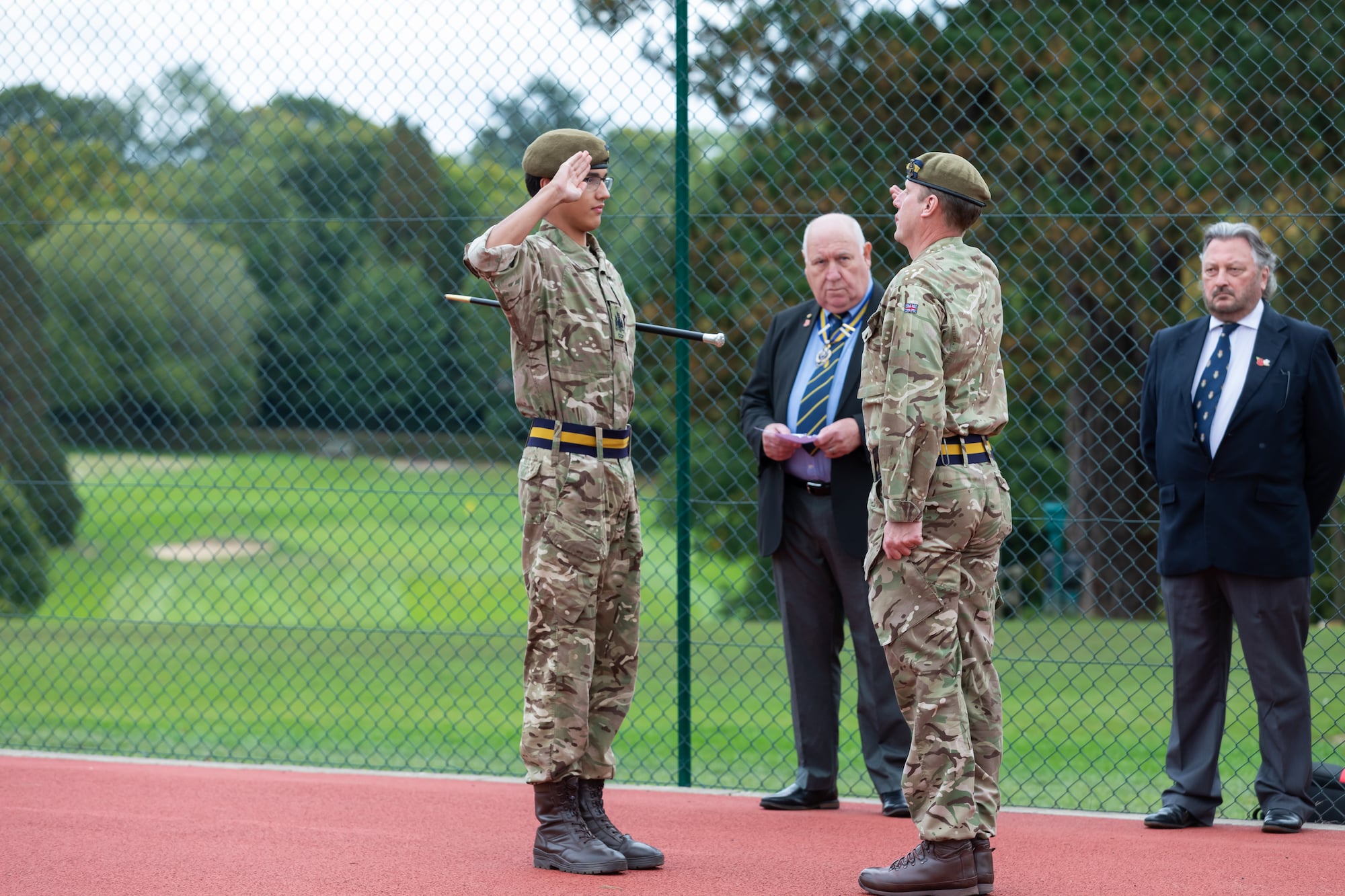 Cranleigh’s annual piano competition is named after the late Cyril Dashwood (OC) and the junior winner was Olivia Chesser for her sensitive playing of a prelude by Scriabin. Olivia really brought out the mystical quality of the music and conveyed a grasp of the piece’s shape and structure, as well as mastering the technical difficulties. Second prize went to Fayruz Mediche for a poised and beautiful rendition of two sketches from op 47 by Glière, bringing out the slightly darker melancholy of the second (no. 9). It was again quiet, warm and intense playing that earned Ed Walshe the third prize, playing an elegy by the Latvian composer Arvids Zilinskis.
Cranleigh’s annual piano competition is named after the late Cyril Dashwood (OC) and the junior winner was Olivia Chesser for her sensitive playing of a prelude by Scriabin. Olivia really brought out the mystical quality of the music and conveyed a grasp of the piece’s shape and structure, as well as mastering the technical difficulties. Second prize went to Fayruz Mediche for a poised and beautiful rendition of two sketches from op 47 by Glière, bringing out the slightly darker melancholy of the second (no. 9). It was again quiet, warm and intense playing that earned Ed Walshe the third prize, playing an elegy by the Latvian composer Arvids Zilinskis.
The junior section began with another Russian piece, a miniature by Gedike (often spelled Goedicke), cousin of the better-known Medtner. Deescha Chandrasma played this from memory with soulful poeticism and sensitive musicality. Angus Barrett also memorised Beethoven’s bagatelle ‘Für Elise’, playing with thoughtful rubato and an especially interesting interpretation of the section before the final recapitulation. Noah Frett was the performer who, I felt, was most unlucky not to get a prize, but he knew he was taking a risk by choosing an improvised jazz piece and cheekily quoting from Beethoven in the middle. There is no doubting, however, that Noah is at home in this idiom and I suspect he could make a living, or at least supplement his income when a student, playing in hotel bars.
Soyoung Choi achieved some genuinely quiet playing in Debussy’s first ‘Arabesque’, though the constant arpeggio-like phrases of this piece are a big challenge in a competition, albeit one she came close to meeting. Abigail Frett displayed an especially delicate and truly elegant keyboard touch in a movement by Galuppi (a composer better known, thanks to Browning, to poetry-lovers than he is to most music-lovers). Zoë Dixon memorised the brief but haunting ‘Mignon’ by Carl Nielsen: a confident and characterful performance with huge promise. Recently David Cameron revealed his musical philistinism on the ‘David Letterman Show’ by not knowing who composed the music to ‘Rule, Britannia’ but Soo Choi, in her neatly accurate playing of the semi-quavers of a sonata allegro by Arne, seemed to bring out welcome echoes of this composer’s most famous piece.
The senior section contained eight pianists and a wide variety of music. Kuziva Ndwere gave us a sturdy minuet and trio by Haydn which was contrasted by Ian Lee relishing the strange harmonic spices and spiky rhythms of Prokofiev. Rachel Hurst gave us a rarely heard Swedish Dance by Bruch (a composer who spent much more time in Liverpool than he did in Sweden) and captured the strangely subdued atmosphere of the piece sensitively. Elinor Morgan controlled superbly the triplets against a tango rhythm in her Albeniz piece: insouciant was the adjective that came to mind as I listened. The ending was especially sensitively done.
Only three pianists are sent through to the Helen Wareham Competition and I am sure many in the audience enjoyed Teresa Yoon’s Rachmaninov so much that they wish she had been one of them. But the G minor Prelude is a phenomenal challenge, not least because the composer wrote pieces that only his exceptionally long fingers could physically encompass and no amateur dare risk the true tempo of the piece without risking total disaster. Given that, I was still bowled over by Teresa’s control her grasp of the masculinity of the piece (Moura Lympany was one of the many pianists in this piece who proved Fanny Waterman’s observation that ‘a woman can play the piano like a man, but a man cannot play like a woman’). The impending menace of the approach of the recapitulation was thrilling after the lyric repose that preceded it and the end had real wit. As the adjudicators’ spokesperson, Marcus Pashley, observed, the slightly slower tempo in the main section also allowed us to hear details of the texture that can get lost in other performances.
Harry McCagherty memorised Mozart’s substantial ‘Fantasia in D minor’ which helped him make it a real interpretation, rather than just a performance. There was one, to coin a phrase (sic, I hope), ‘Liberace moment’ where the classical style was jettisoned for pianistic effect, but this was forgivable in the context of a reading that stressed how modern a piece this still seems. In the allegro section it was as if the sun had come out after the D minor darkness but there was no bathos, as can often be felt at this point.
The second to go through was Hebe Westcott, whose stylishly sensitive playing of Edwin York Bowen’s ‘Reverie’ was revelatory. This composer is being increasingly re-discovered by pianists but Hebe’s playing was the moment where I really understood why and the way in which, rather than seeming an English Rachmaninov, he seemed to me an English Debussy. To balance the filigree of the inner voices so that the melody appears smooth to the listeners is the art that conceals art and, furthermore, Hebe made a potentially meandering journey through keys and harmonies seem a structural straight line. The keys were caressed (remember the Fanny Waterman quotation above?) and the audience drawn into a twilight mood by, it seemed sheer magic. Sometimes the most inward of playing can, through its sincerity, make the greatest impact.
Ben Rudolf was the third ‘winner’ and his musicianly rendering of Chopin’s great waltz in C sharp minor had that touch of spontaneity that implied he could (and will) do the rubato slightly differently next time, as, indeed, he did during recapitulations of the main theme. The ending, in mid-air, was consummately achieved and his mastery of the piece and the keyboard was personal, yet eschewed the excessive indulgences of a Cortot or a Francois. It takes a mature artist to combine a feel for the local effects with a sense of the long line.
The three judges (the others being Catherine Beddison and Philip Scriven) were unanimous in feeling these three were the most special performances on the night, and I heartily agree. The performances were introduced by Marie Ward, one of the many piano teachers who have inspired these young players and guided them wisely and inventively over repertoire.
PJL
Back to all news











